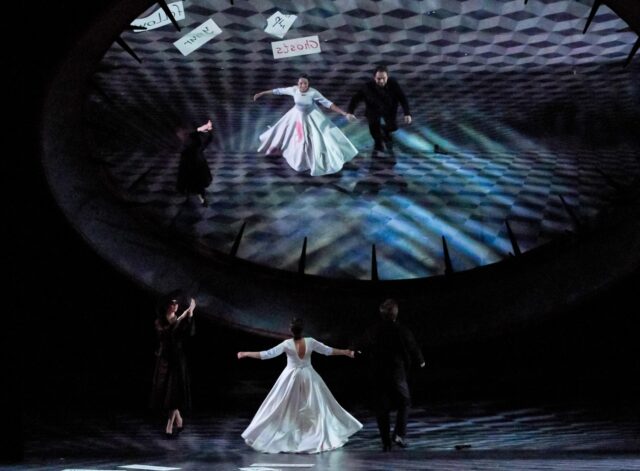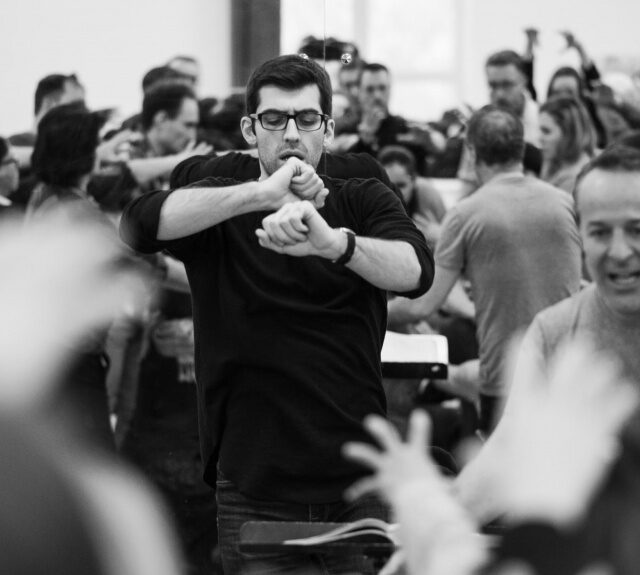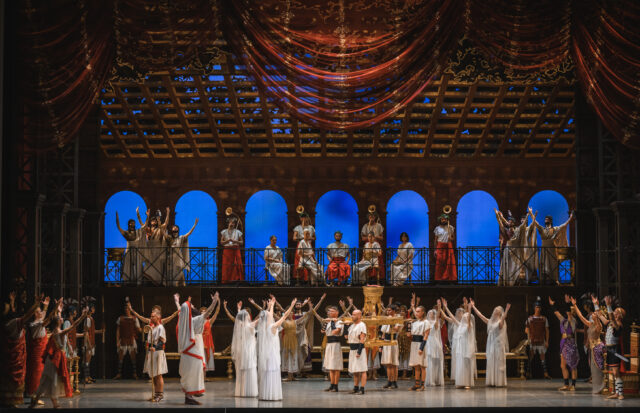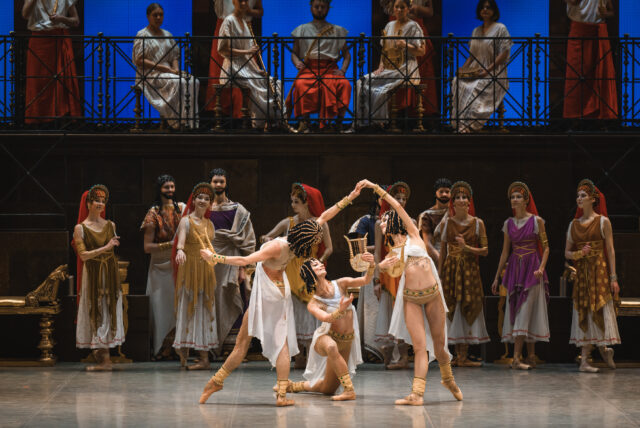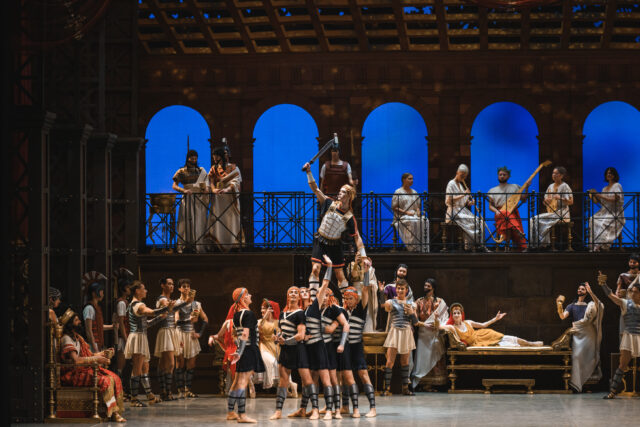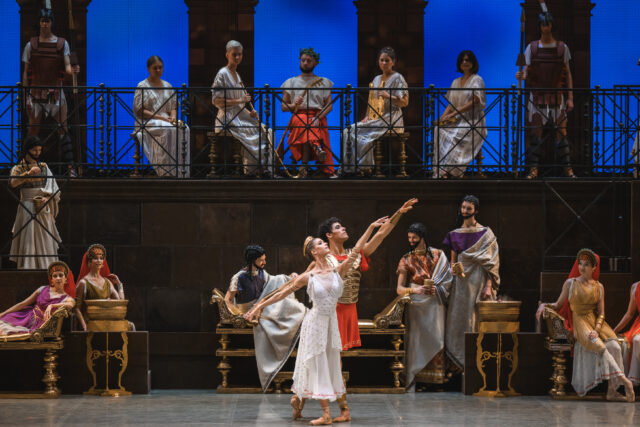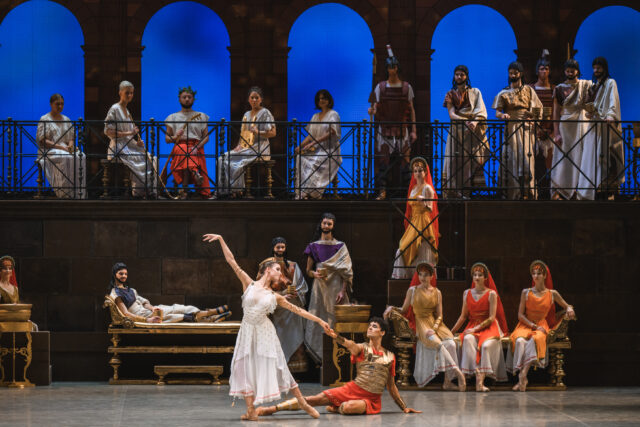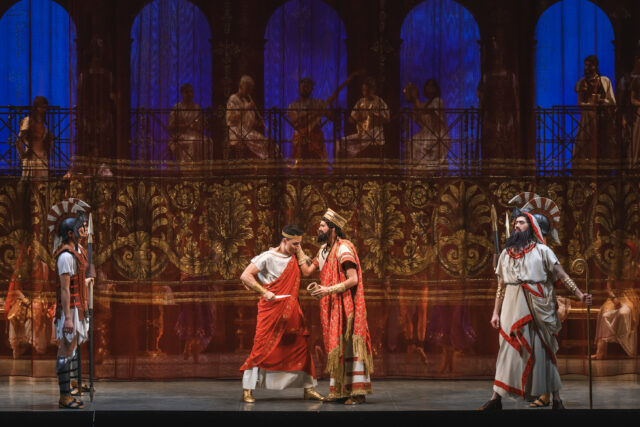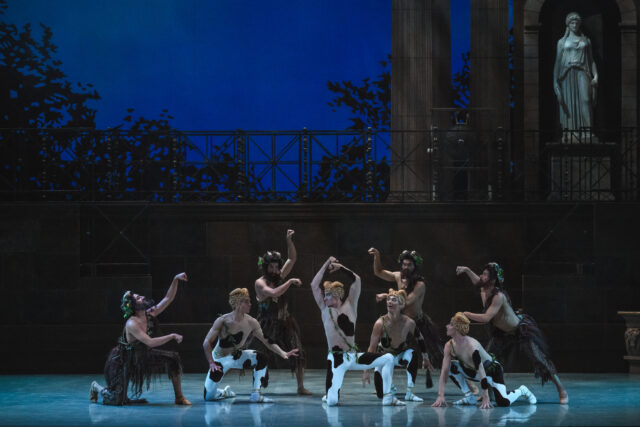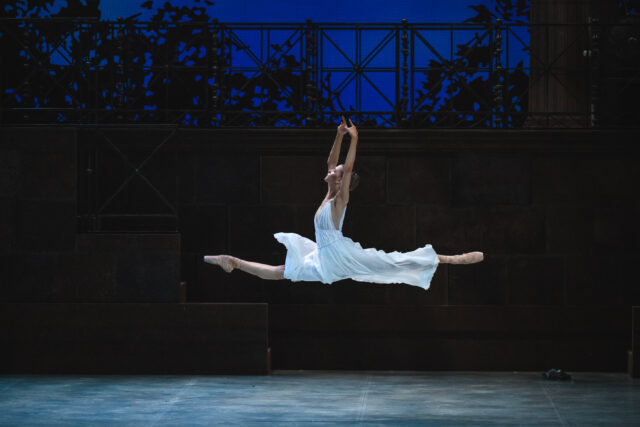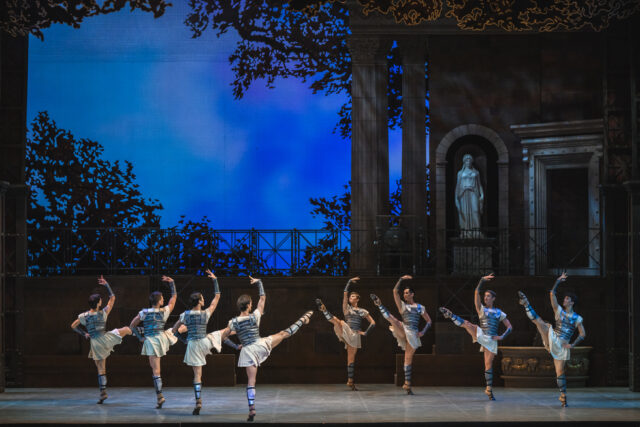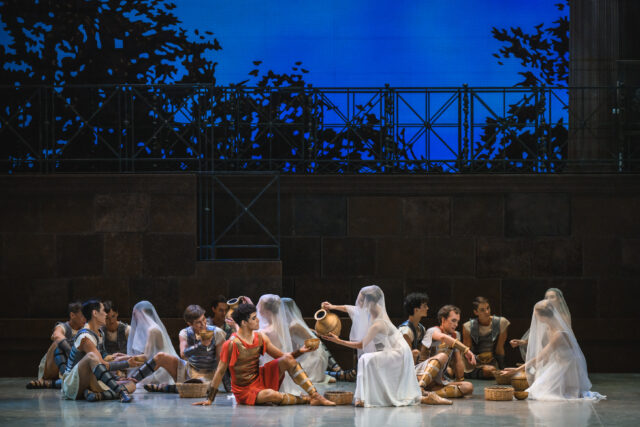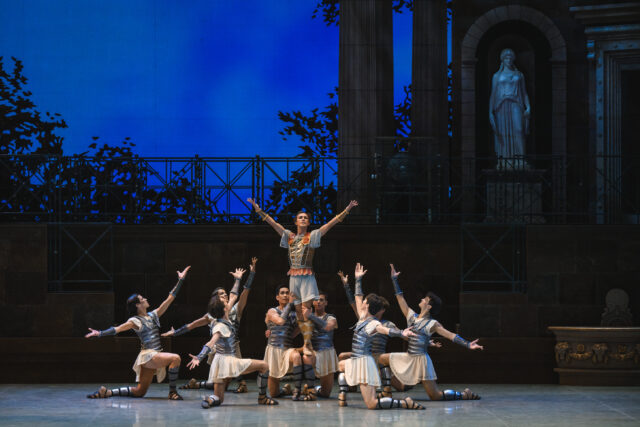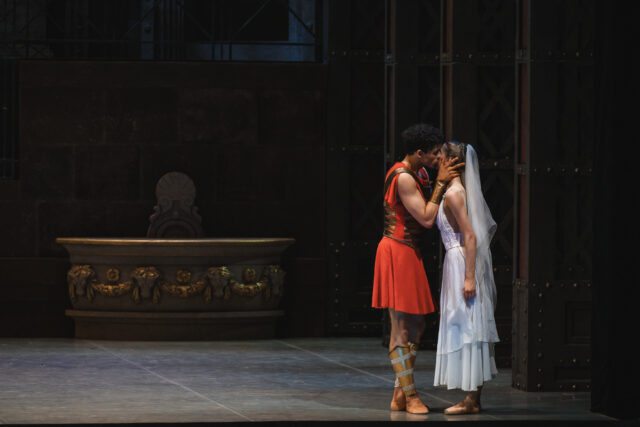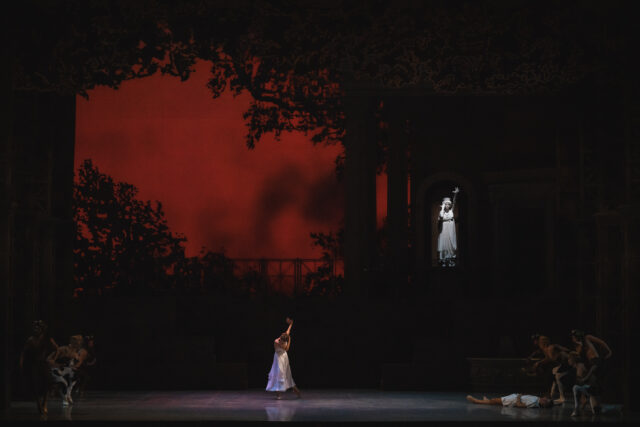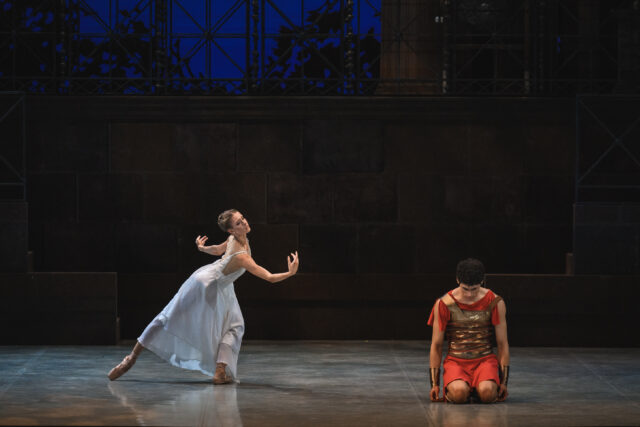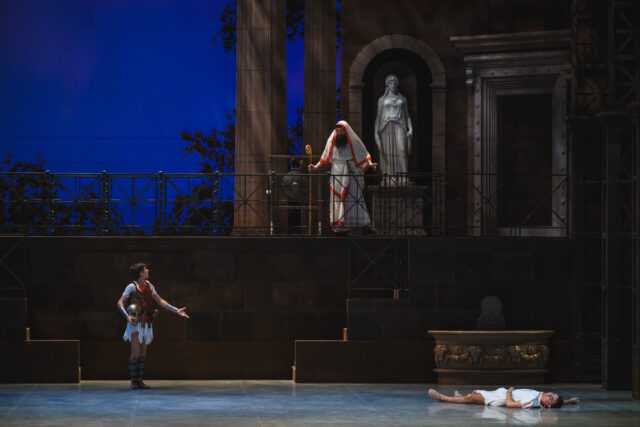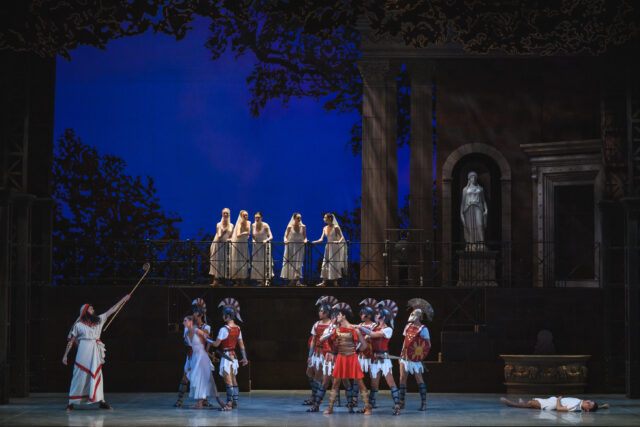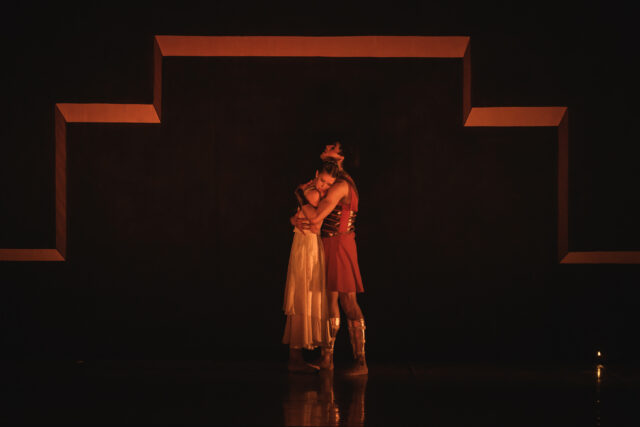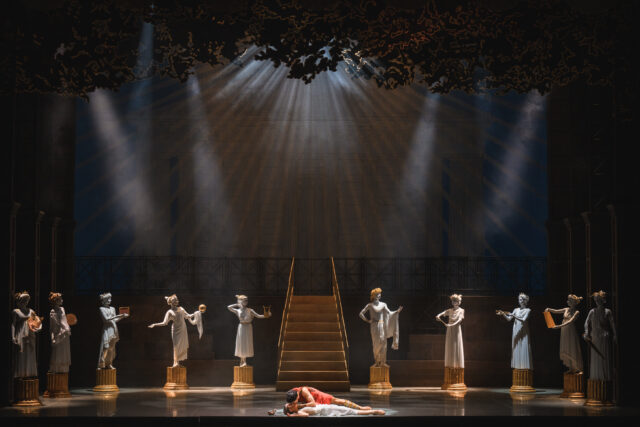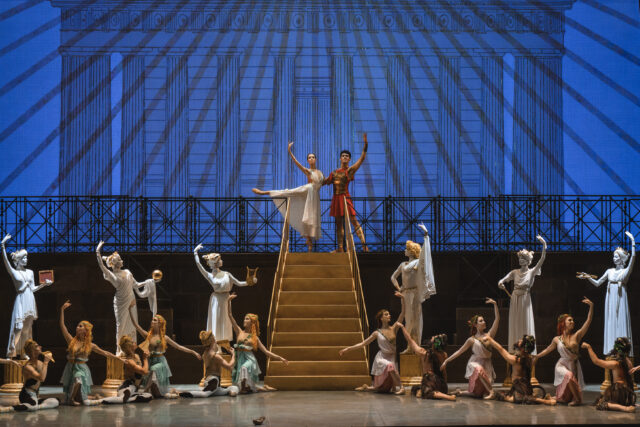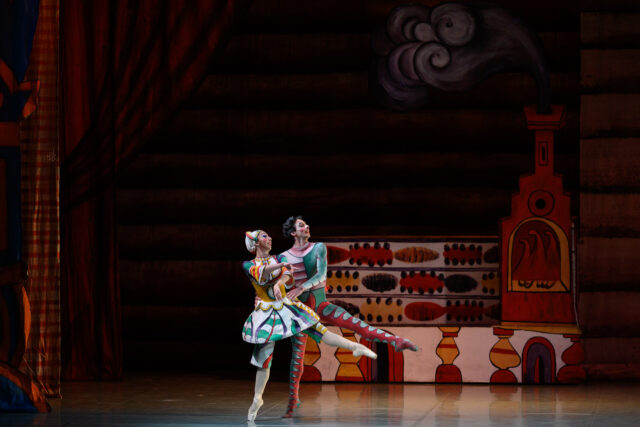
Sylvia
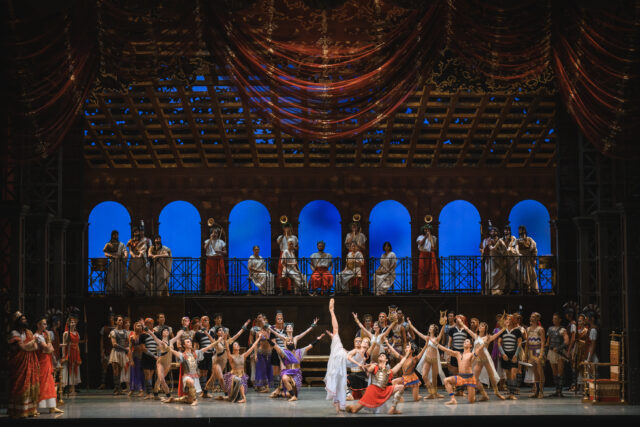
Ballet in two acts with prologue and apotheosis
Libretto by Alexey Miroshnichenko
based on the legend of Rhea Silvia and Raffaello Giovagnoli’s novel Opimia
The ballet was composed in 1876 and, in this stage version, premiered in Perm in 2024.
The first ballet performed in 1876 at the newly built Palais Garnier, Sylvia by Léo Delibes earned its reputation as a gem of the French Romantic repertoire. Pyotr Ilyich Tchaikovsky considered Delibes’ score an absolute masterpiece of musical theater, admitting that, had he known of it earlier, he would never have undertaken the composition of Swan Lake.
In the 20th century, Sylvia secured its place in ballet history thanks to the iconic productions of Frederick Ashton and John Neumeier. In Perm, it was presented in Alexey Miroshnichenko’s original version, featuring a new libretto inspired by ancient mythology and the novel Opimia by Italian author Raffaello Giovagnoli.
Miroshnichenko collaborated on the original musical adaptation of the score with Ivan Khudyakov-Vedenyapin, for whom Sylvia marked his debut as a conductor for a major ballet production.
Synopsis
Action takes place in Latium, Alba Longa, in the 8th century BC.
Prologue
Square in front of the palace of Numitor, the king of Alba Longa. Early in the morning, as soon as the roosters have crowed for the third time, the commander of the army of Alba Longa, the brave Lucius, comes to the square. The commander greets the new day with great excitement, because today at the ceremonial feast Numitor will announce his marriage to Numitor’s daughter, the beautiful Silvia. Fluttering nymphs try to twirl Lucius in their dance, but no one and nothing can occupy his thoughts now except his beloved Silvia. The peasant women appear. They have the honour of decorating the square for the upcoming celebration. The king’s brother Amulius personally meets honoured and noble guests.
Act 1
A richly decorated banquet hall in the palace of Numitor. Everything is ready for the celebration. Smoking censers exude an intoxicating aroma, the tables are overflowing with food and fruit, beautifully dressed slaves scurry among the feasters, serving golden cups filled with wine. Bucinators blow copper trumpets, announcing the arrival of guests. Tarchon, the king of Etruria, the Phoenician king Eshbaal and his beautiful wife Zivar present Numitor with their gifts. The noble citizens of Alba Longa greet their good-natured king. Numitor’s desired guest, the valiant Lucius, also appears.
The king of Alba Longa announces the engagement of hero Lucius to his daughter Silvia. The celebration begins. Everything in this banquet hall is conducive to fun. Slave dancers beat their sonorous cymbals and entertain the feasters with lively dancing. Dancers with lyres in their hands delight the guests’ ears with gentle melodies. Ascanius, Lucius’ close friend and comrade, dances with the warriors.
Only Amulius, Numitor’s brother, does not share the general jubilation. He is always gloomy, refuses treats, because he envies Numitor’s good reputation and dreams of removing him from the throne. Amulius has long been conspiring with the supreme pontifex and is only waiting for the right moment to implement his plan.
The merriment is in full swing. Numitor assigns Lucius a forfeit: among the noble women dressed in veils, Lucius must recognize Silvia. Then Numitor will unconditionally give him his daughter in marriage. Lucius, not without doubt, nevertheless recognizes Silvia, throws off her veil and gives it to Numitor as a trophy. The eyes of all the guests are turned to Lucius and Silvia, and they perform their dance, full of love and hope, in front of those present. The feasters are beside themselves with delight, their eyes are shining, everyone is carried away by the joint dance.
The unanimous merriment is interrupted by the warlike sounds of trumpets. The appearing warriors report that the Sabines are pulling their troops to the borders of Alba Longa. Lucius’ duty is to defend his motherland. He says goodbye to Silvia and sets off on a campaign. Together with his army, the friendly Etruscans also set off.
Silvia is in great anxiety, but her father has no doubt about the victory of his army led by the brilliant Lucius. ‘Let us continue the merriment!’ the king proclaims and orders the dancing to resume. The supreme pontifex chooses time and asks Numitor for a private audience, the king invites the high priest into the inner rooms. There, in the tablinum, Amulius is already hiding with the guards. The time has come to implement the terrible plan. Bribed by Amulius, the guards do not resist. Silvia’s father is killed in front of her.
Amulius is merciless to his niece, too. He forcibly leads Silvia into the next hall, where everything is ready for some great rite to be performed. Shocked by the murder of her father, the girl cannot understand what is happening. For some reason, augurs, epulones, priestesses, vestals, and young noble Latin women have gathered in the hall. At the sight of the urn for drawing lots, Silvia guesses what this means. Meanwhile, the high priest announces, thirty years have passed since the initiation of one of Vesta’s servants. According to the laws, she is now free from her vow, and her place in the temple must be taken by another. The most noble citizens of Alba Longa will have the great honor of approaching the urn to draw lots. The one who gets the wreath of white verbena will be considered the most worthy and chosen by the goddess Vesta herself! One by one, the girls approach the urn, taking out wreaths of red verbena and, not hiding their joy, step aside. It is Silvia’s turn. She tremblingly lowers her hand into the urn. She gets the wreath of white verbena. Silvia freezes in confusion, despair reflected on her face.
‘No, it can’t be! I can’t be a Vestal! I’m already engaged!’
‘Engaged, but not married! The will of the gods has been fulfilled! A wreath of innocence — for you!’ the supreme pontifex answers.
Having lost her last strength, Silvia resigns herself. After the initiation ceremony, the priests bring a luxuriously decorated litter. On it, Silvia is solemnly carried to the temple of Vesta. The usurper, having forced her to become a Vestal and take a 30-year vow of celibacy, becomes the only legitimate heir to the throne. Amulius triumphs.
Act 2
The sacred grove at the temple of Vesta, the goddess of fire that cleanses and refreshes the earth. It is quiet and peaceful here. Faint rays of moonlight penetrate the foliage, the sacred flame burns on the altar of the goddess Vesta. In the mysterious silence, fauns, dryads, satyrs and nymphs frolic to their heart’s content. Until sunrise, the sacred grove is at their disposal. With the first rays of sun, Silvia emerges from the temple. It is her turn to serve at the sacred fire, but she cannot stop thinking about her fiancé.
The sounds of military trumpets are heard from afar. This is Lucius and his army returning from a victorious campaign. Silvia hurriedly retreats to the temple. Lucius’ warriors appear, then Ascanius and Lucius himself. They decided to make a stop in the sacred grove. Veiled Vestals emerge from the temple and treat the tired warriors. Silvia has to go up to Lucius and offer him cakes and wine. Her face is unrecognizable through the veil, but Lucius thinks the silhouette of this Vestal is familiar. He starts a conversation with her, but the girl keeps hiding her face.
The warriors disperse to find a place to rest. The Vestals take their baskets and quietly return to the temple. Only one stops and, looking at the talking couple, reproachfully shakes her head: if the Vestal breaks the vows she made, she will not only face the punishment of gods, but also the cruel punishment of being buried alive!
During the conversation, Lucius cannot control his curiosity and removes the veil from the girl. He is confused: it’s Silvia! But how? It can’t be! Having met each other again, the lovers do not know what to do. Lucius promises to return for Silvia and take her to distant lands, where they will be happy.
A trumpet call to the warriors is heard in the distance. Silvia, deep in thought, watches Lucius for a long time, but her thoughts are interrupted by peasant women and shepherds who have arrived with gifts for the temple. Among them is Amulius, disguised as a shepherd. After the festive procession leaves, he hides near the temple to follow Silvia. Ascanius appears with a letter from Lucius. Amulius takes the letter from Silvia by force. In attempt to get it back, Silvia stabs the hated murderer of her father.
Silvia is overcome with trembling and confusion. What an evil fate! A strong wind rises, a thunderstorm begins. The girl tries to hide in the temple. But the statue of Vesta, in which the goddess herself has entered, comes to life and does not allow the apostate to enter. Silvia loses consciousness.
When Silvia doesn’t come to the appointed place, Lucius finds her unconscious on the threshold of the temple. They must run. But the girl is broken by the events of the day. She is ready to submit to her fate. The guards run in looking for the king who has disappeared from the palace. He is found stabbed to death in the sacred grove. Hearing the noise, the supreme pontifex comes out of the temple and orders the guards to catch the culprits. Silvia and Lucius try to hide, but they are captured. For breaking her vow and murder, Silvia must be buried alive. Her lover also awaits execution — he will be beaten to death with a large wooden staff. Lucius begs the pontifex to bury him alive with Silvia. The pontifex agrees, recognizing Lucius’ military merits.
Apotheosis
Temple of the Arts. Apollo and his Muses glorify the feat of love of Silvia and Lucius.
Stage Directors
Ivan Khudyakov-Vedenyapin
Musical director and conductor
Libretto author and choreographer
Alyona Pikalova
Set designer
Costume designer
Lighting designer



